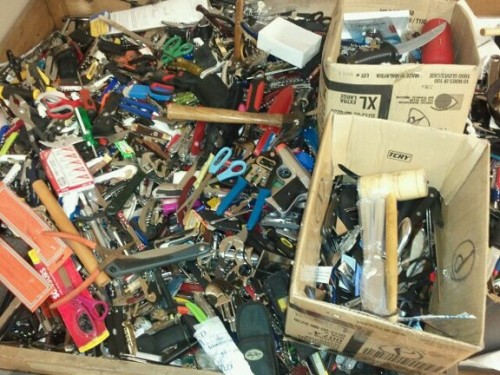
Each Friday on msnbc.com’s Overhead Bin, I track down the answer to a reader’s question. This week’s question was: What happens to all that stuff ‘surrendered’ at airport security checkpoints?
Betty Spencer doesn’t travel much, but she’s curious about what happens to items confiscated or surrendered at airport security checkpoints. “There are so many stories of people having to give up items,” Spencer, a patient accounts counselor in Spokane, Wash., wrote to Overhead Bin. “I wondered if any of the items could be donated or recycled. I would hate to think of so much waste.”
The Transportation Security Administration does indeed end up with a lot of stuff: Since 9/11, the TSA has detected approximately 50 million prohibited items, including 4,600 firearms, during airport checkpoint screening.
Hazardous materials are disposed of, and dangerous or illegal items such as guns and explosives are turned over to law enforcement. But travelers do have some say in what happens to other items.
“TSA offers passengers multiple options at the checkpoint for prohibited items that are less dangerous and not illegal,” said TSA spokesperson Greg Soule. “Passengers can return them to their cars, pack them in checked baggage, or at some airports, mail them home to themselves.”
More often than not, travelers end up surrendering their items at the checkpoint. After that, Soule says, the items end up being donated to state governments “to be auctioned off or sold as revenue. TSA in no way profits from surrendered or lost items at the checkpoint.”
Some states, such as Pennsylvania, operate a brisk and profitable business selling items left behind at airports in the state – and beyond.
“Not all states have a program that’s large enough to accept all the items left at airports,” said Troy Thompson, spokesperson for the Pennsylvania Department of General Services. “But we do. And we receive pallets of items from New York’s JFK and LaGuardia airports and from some airports in Ohio and Maryland.”
Thompson said all the items Pennsylvania gathers end up at a warehouse, where it’s sorted.
“We get a lot of pocketknives, scissors and corkscrews,” said Thompson, “but also frying pans and other cookware, and tools such as drills, saws, hatchets and machetes. Some of it makes you scratch your head and wonder how people thought they’d get those things on the plane.”
A sampling of the items are put out in a store at the state warehouse in Harrisburg, but most of the items get sold in lots, by weight, online at auction. Since 2004, Pennsylvania has earned about $700,000 from auctions held for many years on eBay and, soon, on govdeals.com.